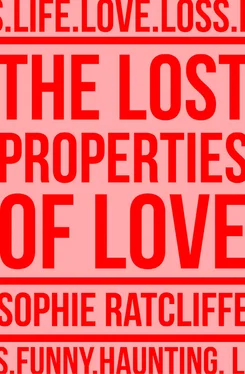My brother once told me that the Germans have a word for that feeling you get on a Sunday afternoon – they call it Sonntagangst . I thought he was joking, but held on to the joke nonetheless, as a good way of catching the mood of those suburban weekends. We were stuck in, or under, the grip of it – and I could feel that bored sadness drifting around the room, so strongly I felt that I could almost hold it. Monday sat on the front steps waiting for us, and we thought about its world of beginnings – polishing shoes and washing in the avocado green plastic bath, with its crack along the front panel. But Sunday afternoons seemed soaked in desolation, as limp as the toast and honey on the blanket-box coffee table. Alain Prost drove his nose around Brands Hatch again and again, the dust flying off the curves of the track, with a sound like someone screaming through the air.
Perhaps the most frightening thing about an atmosphere is that it’s contagious. It gets everywhere, like glitter. The atmosphere begins when two people refuse to understand each other. She, let us say, wishes to eat a bowl of cornflakes and do some work. He, perhaps, wants to hang out some laundry. She perceives his laundry hanging out to be a tacit criticism of her choice to work. He wonders why she needs four cups to be on the table simultaneously, rather than using the same one each time she makes a cup of tea. Everything about his actions of laundry-collection are perceived by her to be a kind of aural reproach. The way he is sighing quietly as he untangles a leg of her wet tights that is knotted, lumpily, around the leg of his wet jeans, and the way he hefts the lump of laundry into the basket – both are obviously directed towards her. He sees her gaze into the middle distance, not visibly working, as a sign that she has disconnected, too easily, from the family unit. He walks out of the room carrying the basket. A sock falls out of the silver drum, onto the floor, and she follows him, then feels obliged to join in. They put the smallest wet clothes on children’s hangers. He silently corrects the way she carelessly places the socks on the stand, smoothing out the creases that will delay drying time or cause mildew by doubling or tripling the damp factor. Both know they are right. The atmosphere settles in, like mist on an autumn evening. The terrifying thing about it is that atmospheres, like mist, get everywhere. There is no escape. So the two people who are trying to retain autonomy find themselves floating in the same emotional soup. They have seeped into each other. They are both pissed off. Somebody suggests a walk.
I am not a natural walker. I am not a nature person. When people tell me I’m missing out, I know they’re probably right and my mind stamps a petulant and defensive foot. My sympathies lie with another nature unlover. I don’t like mountains , W. H. Auden’s boyfriend told him, when offered a romantic minibreak in the Alps. I only like towns where there are shops. Poor Wystan. Poor Gerhart. Sometimes I meanly imagine that everybody else’s families dislike the whole walking thing as much as I do. That they’re just being dutiful. We should get some air , they say to each other. We ought to stretch our legs. It would be good to get out. I imagine that underneath it all is an unacknowledged desire to escape, if not from each other, then into a kind of fantasy involving wellington boots, Poohsticks and a sudden, uncharacteristic interest in wildlife.
Even now, I struggle with the first steps. Standing in the narrow hallway, desperately trying to find coats, hats, missing gloves. Someone complains that their wellingtons chafe around the lower calf. Someone else cannot do up their zip. Someone scratches their head, and you wonder if they might have nits again. Everybody is finally dressed. Then someone wants a snack, and someone else needs a glass of water. We stand on the flagstones, staring up at the light and the drizzle, and then we all set off.
The scenery is different, but the atmosphere persists. Nobody can go too far ahead. You can’t dive into a local pub and give up. To walk back home would be to cause a scene. Headphones are generally frowned upon, but you can possibly get away with earmuffs. In some senses, the walk offers family members a good deal less freedom. There is no shed to hide in. There are no curtains. You cannot claim exhaustion and take a nap. Everyone must exist in roughly the same geographical arena. Everyone must appear to enjoy the walk (at least moderately). There’s a reason one of the greatest novels in English begins with its heroine’s delight that there was no possibility of taking a walk that day . There’s a reason Jane Eyre appeals to teenagers. There are no window seats on family walks. And you can’t read a book while walking with your family.
Our regular weekend walk in West Finchley was always the same. Out of the front door to the road end where my brother rode his Chopper, and left through the mesh of gates with the notice that read NO HORSE RIDING. Then the muddy path with the tennis courts on our right, the wooden bridge beside the drainage pipe, turning right along the path of the river, and around the corner where the trees thinned out, leaning over the water, the smell of wild garlic overpowering. Then through the winners of the best-kept small allotment in Barnet, on the path lined with cow parsley behind netball wire. Sometimes we went across Fursby Avenue to the park with the big swings and the proper silver slide. But that park was far enough away that it never seemed to quite belong to us. Usually we turned around at the final gate and walked back down the river bend, kicking our way through the flattened chestnut branches.
When I was eight, I moved schools, and my father started to take me there on the Tube. The connection from West Finchley was a slow one, as the line divided just before it, at Mill Hill East – so you had to wait that bit longer for the train. The station was in the opposite direction to the woods, off the main road, hidden down a slope, after the Chinese takeaway and the post office and Dick’s the Grocers, and what was then a chemist but would soon become a video rental store. When my father went into Lovesay & Son to get his paper, I would look up at the pale blue lettering, wondering at the name. Lovesay. Inside, I would stand at the shelves, looking at the rows of sweets. Opal Fruits and Frazzles and Parma Violets became muddled in my mind with the idea of amorous declarations and headlines. A collection of objects hung on the opposite wall, suspended in air like my old Ladybird Key Words book. Watering can. Trowel. Funnel. Bucket.
Mr Lovesay didn’t seem to have a son. He wore a brown shop coat and walked back and forth between the rear of the shop and the counter. Whenever he sold something, he would tear off a small numbered ticket from a perforated pad. I wondered if love was something you could tear, as well as something you could say.
Every morning, I would have my small travel pass ready to show at the gate where nobody ever stood. We would walk over the latticed bridge and wait for the train, at the far end, past the wooden waiting room, looking up at the sign for NEXT TRAIN. The 1959 stock shuffled out of an invisible siding, confirming itself as via Bank or via Charing Cross, terminating at Morden. This was a world of strange words. Via. No smoking. The sliding doors would open and I would take a seat in the nearly empty carriage, feeling the prickly blue-green tartan moquette on the back of my bare legs, and looking at the lined wood floor.
The sign for Lovesay & Son is still there, its pale blue fading into white, like the veins on a porcelain wrist. Dick’s the Grocers has long gone, turned into a salon that announces its treatments in a list to the right of the door: Manicure & Pedicure, Cavitation Weight Loss, Gel & Acrylic Nails, Teeth Whitening, Eyebrow Shaping, Hair Extensions, IPL Hair Removal, Skin Rejuvenation, Microdermabrasion, Botox and Fillers, Massage, Facial, Waxing. And the Northern Line still has the same two branches going south into London that never meet. We wanted to get onto the other branch, so we always had to go too far to get to where we needed to, and go back out of town again. The first stop of the journey took just moments, a slowish grind past some shrubbery and an arched bridge, but then the train stopped again for ages at Finchley Central, a junction station that looked like a Swiss lodge, all frilled wooden panels and bottle green paintwork. Finally we sped up on our way to East Finchley (birthplace of Jerry Springer), with its deco staircases, glazed in glass tubes. Then we were flying again, past endless allotments, and the rainbow colours of electric cables and the blind backs of houses with their sheds at the bottom of the garden, through a small tunnel, and the Tube really became the Tube, with that familiar rick-rack sound, plummeting down under Highgate Hill towards Archway, Kentish Town and Tufnell Park.
Читать дальше












